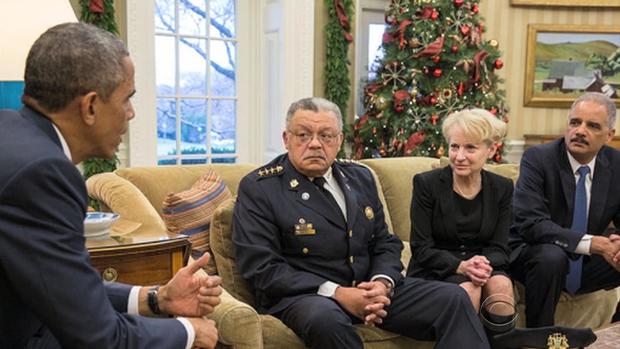The backstory on Obama's approach to defusing racial tensions
President Obama condemned the killings of officers Wenjian Liu and Rafael Ramos. But there have been calls for the nation's first African-American president to do more to diffuse tensions after two grand juries cleared white officers in the deaths of black men.
As protests raged throughout the country, the White House debated ways to put President Obama at the center of the race and justice debate. Obama dismissed many as too showy or distracting. Among the ideas floated, a town hall on racial divisions, an event highlighting black and white churches building racial reconciliation, trips to memorialize Michael Brown or Eric Garner, or an ambitious national speech on race.
"The speech that needs to be had ultimately is the speech about citizenship and democracy," said Ben Jealous, who led the NAACP from 2008 to 2013. "This president's greatest power is to call citizens of the country into action to shape the future of their country. He should not give that up."
Top advisers bristle at accusations the president is AWOL. They describe an intense push for law enforcement reform built around the president's new task force due to report in early March. Obama spoke to its leader, Philadelphia police chief Charles Ramsey and New York police commissioner Bill Bratton hours after the police murders. In addition, top White House adviser Valerie Jarrett counseled New York Mayor Bill de Blasio on ways to reduce tensions.
Absent grand public gestures, the president has tried to balance respect for law enforcement with calls for new methods and youthful activism, as he did on BET's "106 and Park."
"Simply by virtue of color you've got less margin for error," Obama said. "And that's particularly true for black boys. We want them to be given the same benefit of the doubt as any other man would, or any other boy would be given. "
The White House sought out the "106 and Park" interview, viewing it as a conduit to encourage those agitating and organizing on their own.
As for a race speech, advisers say the president already gave it in 2008 when he was far more popular and when racial polarization was less apparent. These times, they say, call for activism from below not rhetoric from above.
"The president stepping into that moment in a rhetorical way might have silenced other voices that we now hear and that we would not otherwise have heard," said Sherrilyn Ifill, president of the NAACP's Legal Defense Fund, and a frequent outside White House adviser. "People had to speak for themselves and actually that's the requirement of citizenship."
The president's cautious approach, tested for months, reflects a quieter strategy to encourage and, if possible, guide national change over time. The president calls this the "long game," one he believes has only just begun.

